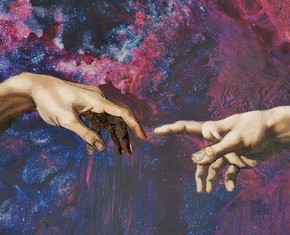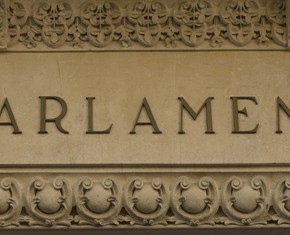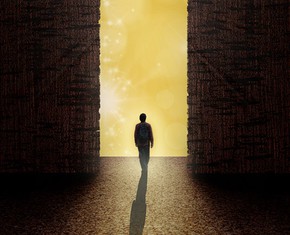The views expressed in our content reflect individual perspectives and do not represent the authoritative views of the Baha'i Faith.
Have you—like my young son as he grew up—ever wanted a rule book for life?
In the first essay in this series of articles on the spiritual rules of life from a Baha’i perspective, I quoted a passage from a letter Abdu’l-Baha wrote to a Baha’i woman who asked for a rule she could use to guide her life. In his short answer, Abdu’l-Baha gave her a brief but amazingly profound set of spiritual guidelines, all in one single paragraph, for living a good life. Here, I’ve separated the phrases and sentences in that paragraph from one another, and bulleted them as a single list, just the way my young son wanted it, for easy reference:
- Believe thou in God, and keep thine eyes fixed upon the exalted Kingdom;
- be thou enamoured of the Abha Beauty;
- stand thou firm in the Covenant;
- yearn thou to ascend into the Heaven of the Universal Light.
- Be thou severed from this world, and reborn through the sweet scents of holiness that blow from the realm of the All-Highest.
- Be thou a summoner to love, and be thou kind to all the human race.
- Love thou the children of men and share in their sorrows.
- Be thou of those who foster peace.
- Offer thy friendship, be worthy of trust.
- Be thou a balm to every sore, be thou a medicine for every ill.
- Bind thou the souls together.
- Recite thou the verses of guidance.
- Be engaged in the worship of thy Lord, and rise up to lead the people aright.
- Loose thy tongue and teach, and let thy face be bright with the fire of God’s love.
- Rest thou not for a moment, seek thou to draw no easeful breath.
The first sentence of Abdu’l-Baha’s advice, with its four dependent clauses, all has to do with developing and sustaining a strong belief in a Supreme Being:
Believe thou in God, and keep thine eyes fixed upon the exalted Kingdom; be thou enamoured of the Abha Beauty; stand thou firm in the Covenant; yearn thou to ascend into the Heaven of the Universal Light. – Selections from the Writings of Abdu’l-Baha, p. 26.
“Believe thou in God,” he wrote, “and keep thine eyes fixed upon the exalted Kingdom.” Here he tells us that this creation has a Creator, and asks us to constantly be mindful of our Creator. He tells us, too, that an “exalted Kingdom” exists, a realm beyond the physical which we can aspire to, hope for and aim towards. He promises us, in other words, that this material life doesn’t limit our existence.
When I initially read this passage, it surprised me that the Baha’i teachings would begin such a listing of life-rules with a prescription for belief in God. But the more I thought about it, the more I realized what a solid foundation that belief can build. If you’re firmly convinced that your Creator loves and values you; if you hold a vision of an exalted Kingdom that confers life after death; then you can dispense with fear. You can see that death, the source of so much human anxiety and dread, has no power to harm you. You can conceive of an everlasting life, and realize that you will truly live forever.
Then Abdu’l-Baha wrote “be thou enamored of the Abha Beauty” and “stand thou firm in the Covenant.” That part of this passage probably needs some explanation.
In the Baha’i writings, Baha’u’llah has several honorific titles and names: the Blessed Beauty, the Pen of the Most High, the All-Highest Horizon, the Most Great Ocean, just to mention a few. The title “Abha Beauty” uses “Abha,” a superlative form of the word “Baha,” which means “glory” or “glorious.” The name Baha’u’llah means “the glory of God.” These poetic, metaphorical names indicate the high, honored station of a messenger of God, and refer to the deep spiritual beauty of the message itself.

Seat of the Universal House of Justice (the elected leadership of the Baha’i Faith)
Also in this passage, the capitalized word “Covenant” refers to the plan Baha’u’llah set in motion before his passing to provide for the harmonious and continuous operation of the Faith. The Baha’i covenant, which has resulted in a succession of appointed and now elected leadership to guide and direct the global Baha’i community, has maintained and protected the unity of the Faith for more than a century.
So when Abdu’l-Baha asks us to believe in God, to keep our eyes fixed on the exalted Kingdom, to be enamored of Baha’u’llah’s message and to stand firm in the Baha’i covenant, he’s giving us a new way to think about and act on religious belief. Rather than simply following a set of rules and laws interpreted by a member of the clergy; this new spiritual call to all humanity asks each of us to individually and autonomously decide for ourselves whether we believe in a Creator, and then to make an informed, rational and reasonable decision about what actions that belief inspires.
Once we make those independent decisions, Abdu’l-Baha wrote, we will “yearn thou to ascend into the Heaven of the Universal Light.”
This inner belief—that a loving Supreme Being made our immortal souls, and that our souls will ultimately ascend to that light-filled realm—begins the Baha’i approach to the rules of life. Rather than starting with a litany of “do’s and don’ts,” it asks us to go beyond the restrictions and laws of this world and recognize the universal law of creation. It asks us to fall in love with our Creator, and to turn our eyes, our souls and our hearts toward the light of a new revelation from Baha’u’llah.
Next: How to be Severed from this World
















Comments
Sign in or create an account
Continue with Googleor